六年级英语语法 如何改写句子
英语改写句子的方法和技巧
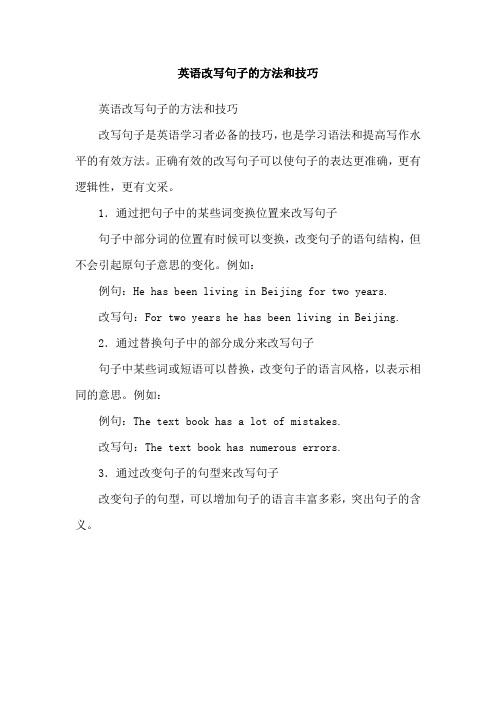
英语改写句子的方法和技巧
英语改写句子的方法和技巧
改写句子是英语学习者必备的技巧,也是学习语法和提高写作水平的有效方法。
正确有效的改写句子可以使句子的表达更准确,更有逻辑性,更有文采。
1.通过把句子中的某些词变换位置来改写句子
句子中部分词的位置有时候可以变换,改变句子的语句结构,但不会引起原句子意思的变化。
例如:
例句:He has been living in Beijing for two years.
改写句:For two years he has been living in Beijing.
2.通过替换句子中的部分成分来改写句子
句子中某些词或短语可以替换,改变句子的语言风格,以表示相同的意思。
例如:
例句:The text book has a lot of mistakes.
改写句:The text book has numerous errors.
3.通过改变句子的句型来改写句子
改变句子的句型,可以增加句子的语言丰富多彩,突出句子的含义。
六年级英语按要求改写句子
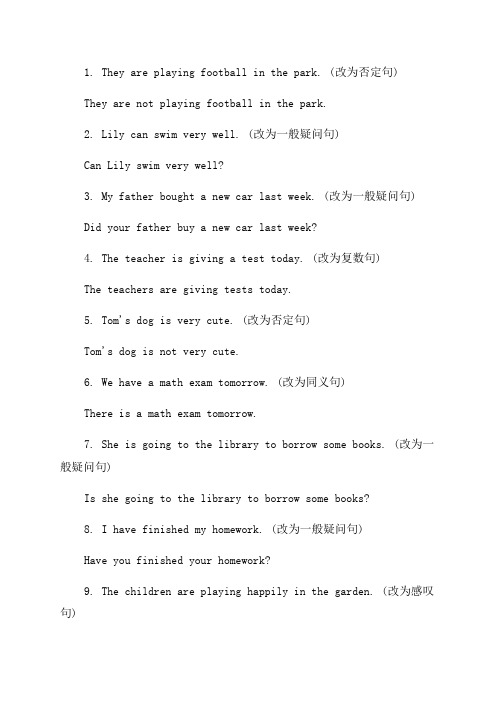
1. They are playing football in the park. (改为否定句)They are not playing football in the park.2. Lily can swim very well. (改为一般疑问句)Can Lily swim very well?3. My father bought a new car last week. (改为一般疑问句)Did your father buy a new car last week?4. The teacher is giving a test today. (改为复数句)The teachers are giving tests today.5. Tom's dog is very cute. (改为否定句)Tom's dog is not very cute.6. We have a math exam tomorrow. (改为同义句)There is a math exam tomorrow.7. She is going to the library to borrow some books. (改为一般疑问句)Is she going to the library to borrow some books?8. I have finished my homework. (改为一般疑问句)Have you finished your homework?9. The children are playing happily in the garden. (改为感叹句)How happily the children are playing in the garden!10. He doesn't like playing basketball. (改为肯定句) He likes playing basketball.。
英语改写句子的规则
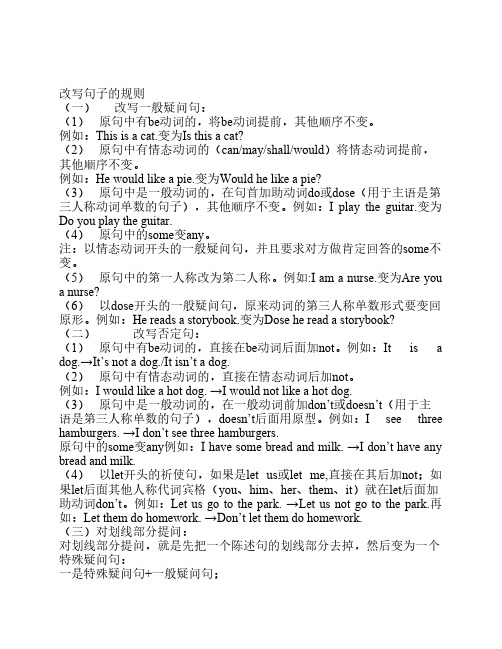
改写句子的规则(一)改写一般疑问句:(1)原句中有be动词的,将be动词提前,其他顺序不变。
例如:This is a cat.变为Is this a cat?(2)原句中有情态动词的(can/may/shall/would)将情态动词提前,其他顺序不变。
例如:He would like a pie.变为Would he like a pie?(3)原句中是一般动词的,在句首加助动词do或dose(用于主语是第三人称动词单数的句子),其他顺序不变。
例如:I play the guitar.变为Do you play the guitar.(4)原句中的some变any。
注:以情态动词开头的一般疑问句,并且要求对方做肯定回答的some不变。
(5)原句中的第一人称改为第二人称。
例如:I am a nurse.变为Are you a nurse?(6)以dose开头的一般疑问句,原来动词的第三人称单数形式要变回原形。
例如:He reads a storybook.变为Dose he read a storybook?(二)改写否定句:(1)原句中有be动词的,直接在be动词后面加not。
例如:It is a dog.→It’s not a dog./It isn’t a dog.(2)原句中有情态动词的,直接在情态动词后加not。
例如:I would like a hot dog. →I would not like a hot dog.(3)原句中是一般动词的,在一般动词前加don’t或doesn’t(用于主语是第三人称单数的句子),doesn’t后面用原型。
例如:I see three hamburgers. →I don’t see three hamburgers.原句中的some变any例如:I have some bread and milk. →I don’t have any bread and milk.(4)以let开头的祈使句,如果是let us或let me,直接在其后加not;如果let后面其他人称代词宾格(you、him、her、them、it)就在let后面加助动词don’t。
六年级上册按要求改写句子

六年级上册按要求改写句子1. 原句:Tom is a tall boy.改写句子:The boy named Tom is tall.2. 原句:She has a beautiful dress.改写句子:Her dress is beautiful.3. 原句:I like to eat ice cream in the summer.改写句子:In the summer, I enjoy eating ice cream. 4. 原句:They went to the park yesterday.改写句子:Yesterday, they visited the park.5. 原句:We have a math test next week.改写句子:Next week, we will have a math test.6. 原句:The cat is sleeping on the sofa.改写句子:On the sofa, the cat is sleeping.7. 原句:He plays basketball every day.改写句子:Every day, he engages in basketball.8. 原句:They are going to the zoo this weekend.改写句子:This weekend, they will visit the zoo.9. 原句:She has long, curly hair.改写句子:Her hair is long and curly.10. 原句:I am going to the library to borrow a book.改写句子:To borrow a book, I am going to the library.通过对六年级上册句子进行改写,我们可以通过改变句子的词语顺序、增加或删除一些词汇来达到题目的要求。
小学六年级英语句型转换方法归纳大全

小学英语句型转换方法归纳大全一、肯定句改否定句——两步法第一步:先找be动词或情态动词。
分三种情况:1:若有be动词is ,am ,are , was , were,在其后加not。
如:is not= isn’t,are not= aren’t, am not= amn’t, was not= wasn’t, were not=weren’t。
2:若没有be动词,有情态动词can,could ,may,might, shall,should ,will,would, need,must等,在其后加not。
如:can not= cann’t,could not=couldn’t,may not(不能缩写) ,might not=mightn’t,shall not=shan’t,should not=shouldn’t ,will not=won’t,would not=wouldn’t need not=needn’t,must not=mustn’t3:若上述都没有,则要在动词前加助动词的否定形式don’t、doesn’t、didn’t。
注意:要先判断句子的时态和主语的人称。
如果句子是过去时,则要在动词前面加didn’t,这个动词改为原型;如果句子不是过去时,则判断主语是否为第三人称单数,如是第三人称,要在动词前面doesn’t,这个动词改为原形;其他情况均要在句子动词前面加don’t。
第二步: some 改成any,剩下的照抄。
eg.This is a pen. →This is not a pen.I can speak Chinese.→I can not speak Chinese.He like English. →He does not like English.I like English.→I do not like English.二、肯定句改一般疑问句——三步法第一步:将be动词或情态动词或者助动词放在句首,第一个字母大写。
小学六年级英语句型转换方法归纳大全
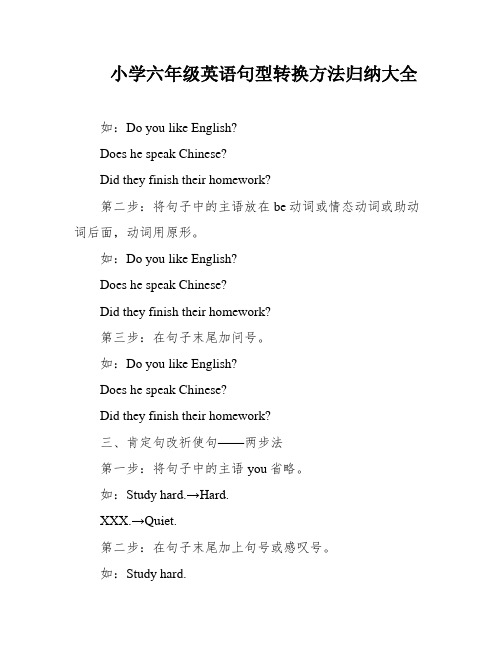
小学六年级英语句型转换方法归纳大全如:Do you like English?Does he speak Chinese?Did they finish their homework?第二步:将句子中的主语放在be动词或情态动词或助动词后面,动词用原形。
如:Do you like English?Does he speak Chinese?Did they finish their homework?第三步:在句子末尾加问号。
如:Do you like English?Does he speak Chinese?Did they finish their homework?三、肯定句改祈使句——两步法第一步:将句子中的主语you省略。
如:Study hard.→Hard.XXX.→Quiet.第二步:在句子末尾加上句号或感叹号。
如:Study hard.Be quiet!Original article:XXX and I went to the park yesterday。
We played catch and had a ic。
The weather was nice and sunny。
We saw some kids XXX。
We had a great time.Corrected and rewritten:XXX。
my friend and I went to the park。
We played catch and had a ic on the grass。
The weather was beautiful and sunny。
While we were there。
we saw some children flying kites and some people walking their dogs。
It was a wonderful day and we had a lot of fun.When forming a n in English。
六年级英语句子改写方法

六年级英语句子改写方法Rewriting English sentences can be a challenging yet rewarding task for 6th grade students. As they progress in their language skills, they are often asked to take simple sentences and transform them into more complex and sophisticated expressions. This process helps students develop a deeper understanding of grammar, vocabulary, and sentence structure, ultimately improving their overall proficiency in the English language.One of the key methods for rewriting 6th grade English sentences is to focus on expanding the basic sentence structure. Many 6th grade students are familiar with the subject-verb-object (SVO) format, which is the most common sentence structure in English. However, by adding modifiers, dependent clauses, and more varied sentence patterns, students can create more nuanced and engaging sentences.For example, a simple SVO sentence like "The dog ran" can be rewritten as "The energetic golden retriever sprinted swiftly across the yard." Here, the subject "dog" has been expanded to "energetic golden retriever," the verb "ran" has been changed to the moredescriptive "sprinted swiftly," and a prepositional phrase "across the yard" has been added to provide more context.Another effective technique for rewriting 6th grade English sentences is to incorporate more complex grammatical structures, such as compound and complex sentences. Compound sentences, which combine two independent clauses with a coordinating conjunction (e.g., "and," "but," "or"), allow students to express more sophisticated ideas and relationships between concepts. Complex sentences, which include an independent clause and one or more dependent clauses, enable students to convey nuanced thoughts and provide additional context or explanation.For instance, a simple sentence like "The girl played soccer" could be rewritten as a compound sentence: "The girl played soccer, and she scored two goals." Alternatively, it could be transformed into a complex sentence: "Although the weather was rainy, the girl played soccer and scored two goals." These rewritten versions demonstrate a deeper understanding of sentence structure and the ability to express more complex ideas.In addition to expanding sentence structure, 6th grade students can also improve their sentence rewriting skills by focusing on word choice and vocabulary. By replacing basic verbs, nouns, and adjectives with more precise, vivid, and descriptive language,students can create sentences that are more engaging and impactful. This might involve substituting a generic verb like "said" with a more specific and evocative one, such as "whispered," "exclaimed," or "muttered." Similarly, a simple adjective like "good" could be replaced with a more nuanced descriptor, such as "exceptional," "remarkable," or "extraordinary."Consider the sentence "The book was good." This could be rewritten as "The captivating novel enthralled the reader with its exceptional storytelling." Here, the generic noun "book" has been replaced with the more specific "captivating novel," the bland verb "was" has been changed to the more dynamic "enthralled," and the adjective "good" has been transformed into the more descriptive "exceptional."Furthermore, 6th grade students can practice rewriting sentences by incorporating more varied sentence structures and patterns. This might involve inverting the typical subject-verb order, using passive voice, or experimenting with different placement of modifiers and dependent clauses. By exploring these alternative sentence structures, students can add greater complexity and nuance to their writing, ultimately enhancing their overall command of the English language.For instance, the sentence "The student completed the assignment" could be rewritten in passive voice as "The assignment wascompleted by the student." Alternatively, it could be transformed into a more complex structure: "After carefully reviewing the instructions, the diligent student completed the assignment on time."Throughout the process of rewriting 6th grade English sentences, it is important for students to maintain a focus on clear, coherent, and grammatically correct expression. While experimenting with more sophisticated language and sentence structures, students must ensure that their rewritten sentences still convey the intended meaning effectively and adhere to the rules of English grammar.To achieve this balance, 6th grade students can engage in various exercises and activities that encourage them to practice and refine their sentence rewriting skills. This might include peer editing, where students exchange their rewritten sentences and provide constructive feedback to one another. Teachers can also incorporate sentence-level exercises into their lesson plans, such as having students identify opportunities for rewriting in sample passages or providing them with simple sentences to transform into more complex expressions.By consistently practicing and refining their sentence rewriting abilities, 6th grade students can develop a stronger command of the English language, enhance their writing skills, and preparethemselves for the more advanced linguistic challenges they will encounter in the years to come. Through this process, they not only improve their technical proficiency but also cultivate the critical thinking and creative problem-solving skills that are essential for success in academic and professional settings.。
六年级英语知识点改写句子
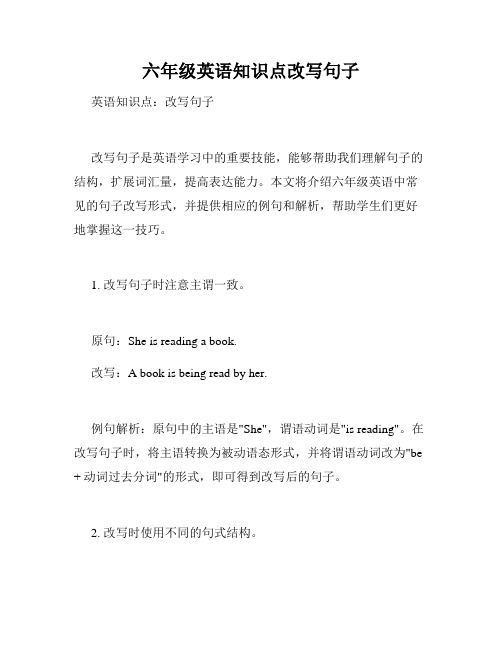
六年级英语知识点改写句子英语知识点:改写句子改写句子是英语学习中的重要技能,能够帮助我们理解句子的结构,扩展词汇量,提高表达能力。
本文将介绍六年级英语中常见的句子改写形式,并提供相应的例句和解析,帮助学生们更好地掌握这一技巧。
1. 改写句子时注意主谓一致。
原句:She is reading a book.改写:A book is being read by her.例句解析:原句中的主语是"She",谓语动词是"is reading"。
在改写句子时,将主语转换为被动语态形式,并将谓语动词改为"be + 动词过去分词"的形式,即可得到改写后的句子。
2. 改写时使用不同的句式结构。
原句:I have a red pen.改写:There is a red pen in my possession.例句解析:原句为正常的陈述句形式。
在改写时,可以使用"There is/are"的句式来引出主语,增加句子的表达形式。
3. 改写句子时注意动词时态的调整。
原句:Lucy went to the park yesterday.改写:The park was visited by Lucy yesterday.例句解析:原句中的动词时态为一般过去时。
在改写句子时,将主语改为被动语态形式,并将动词的时态调整为相应的过去时。
4. 改写句子时注意改变句子的语气。
原句:Don't touch the painting!改写:Let the painting be untouched!例句解析:原句为祈使句,表示命令或建议。
在改写时,将句子转换为被动语态形式,使其成为一种更委婉的陈述。
5. 改写句子时注意改变句子的结构。
原句:He is tall and thin.改写:He has a tall and thin figure.例句解析:原句为简单的主系表结构。
- 1、下载文档前请自行甄别文档内容的完整性,平台不提供额外的编辑、内容补充、找答案等附加服务。
- 2、"仅部分预览"的文档,不可在线预览部分如存在完整性等问题,可反馈申请退款(可完整预览的文档不适用该条件!)。
- 3、如文档侵犯您的权益,请联系客服反馈,我们会尽快为您处理(人工客服工作时间:9:00-18:30)。
如何改写句子
改为否定句:
1.若句中含有be动词(am/ is/ are/was/were)和情态动词can /could 时,只需
在be动词(am/ is/ are/was/were)后面加上not 和情态动词can /could后面加上not
2.若句中没有be动词(am/ is/ are/was/were)和情态动词can /could 时,一般
现在时是在行为动词原形前加上do not (don’t) ,若主语是第三人称单数时,在行为动词原形前加上does not (doesn’t), 一般过去时是在行为动词原形前加上did not (didn’t). 记住用了助动词did ,does谓语动词得变回原形。
改为一般疑问句
1. 若句中含有be动词(am/ is/ are/was/were)和情态动词can /could 时,只要把be动词(am/ is/ are/was/were)和情态动词can /could 移至句首,句末加问号,但要记住,主语第一人称I/We 得变为第二人称you.
2.若句子中没有be动词(am/ is/ are/was/were)和情态动词can /could 时,一般现在时是在句首加上Do ,若主语是第三人称单数时,在句首加上Does,一般过去时是在句首加上Did,. 记住用了助动词Did ,Does谓语动词得变回原形。
3.对划线部分提问:特殊疑问句
记住:所以的特殊疑问句的结构都是:
特殊疑问代词+一般疑问句?
特殊疑问代词的用法:
What 什么用来代替表示活动和事物名称的
Where 在哪里用来代替表示地方及地址的方位介词短语的
Who, 谁用来代替人名及人称代词的
Whose 谁的用来寻求物主的,如:my我的,Nancy’s 南希的等When 什么时间用来询问时间的
Which 哪一个,哪一些,用来分辨事物的
How 怎样用来询问交通等方式,及身体状况的
Why 为什么用来询问理由的,because 引导的句子的
找句子关键词
一、哪些词后面加上动词原形,如下:
助动词do /does / did / will / would。
